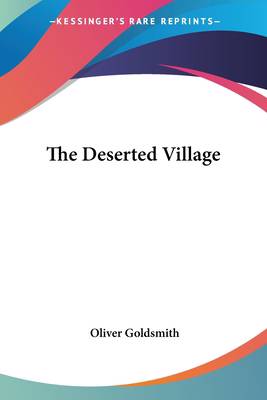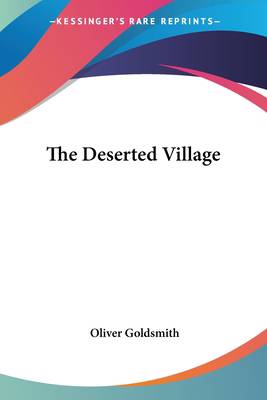
- Retrait gratuit dans votre magasin Club
- 7.000.000 titres dans notre catalogue
- Payer en toute sécurité
- Toujours un magasin près de chez vous
- Retrait gratuit dans votre magasin Club
- 7.000.0000 titres dans notre catalogue
- Payer en toute sécurité
- Toujours un magasin près de chez vous
Description
The Deserted Village is a long narrative poem written by Oliver Goldsmith, an Irish writer and poet, in 1770. The poem is divided into four parts and tells the story of a once-thriving village that has become abandoned and desolate due to the encroachment of modernization and urbanization. The poem is set in the fictional village of Auburn, which is based on Goldsmith's own childhood home in Ireland.In the first part of the poem, Goldsmith describes the idyllic beauty of Auburn and its inhabitants, who live simple and content lives in harmony with nature. In the second part, he laments the changes that have taken place in the village, as wealthy landowners have forced the peasants off their land and turned it into commercial farms. The villagers are forced to leave their homes and seek work in the city, and Auburn becomes a ghost town.In the third part of the poem, Goldsmith reflects on the consequences of modernization and industrialization, which have led to the destruction of the natural environment and the displacement of rural communities. He criticizes the greed and selfishness of the wealthy landowners and calls for a return to a simpler, more sustainable way of life.In the final part of the poem, Goldsmith imagines a future in which Auburn has been restored to its former glory, and its inhabitants have returned to live in harmony with nature. He concludes by reminding readers that the beauty and value of rural life cannot be measured in monetary terms and that true happiness comes from a connection to the natural world.Overall, The Deserted Village is a powerful critique of the social and economic changes that were taking place in 18th-century England and Ireland, and a call for a return to a more humane and sustainable way of life. It is also a celebration of the beauty and value of rural life and a reminder of the importance of preserving the natural environment.This scarce antiquarian book is a facsimile reprint of the old original and may contain some imperfections such as library marks and notations. Because we believe this work is culturally important, we have made it available as part of our commitment for protecting, preserving, and promoting the world's literature in affordable, high quality, modern editions, that are true to their original work.
Spécifications
Parties prenantes
- Auteur(s) :
- Editeur:
Contenu
- Nombre de pages :
- 48
- Langue:
- Anglais
Caractéristiques
- EAN:
- 9781419128103
- Date de parution :
- 01-12-04
- Format:
- Livre broché
- Format numérique:
- Trade paperback (VS)
- Dimensions :
- 152 mm x 229 mm
- Poids :
- 81 g

Les avis
Nous publions uniquement les avis qui respectent les conditions requises. Consultez nos conditions pour les avis.






